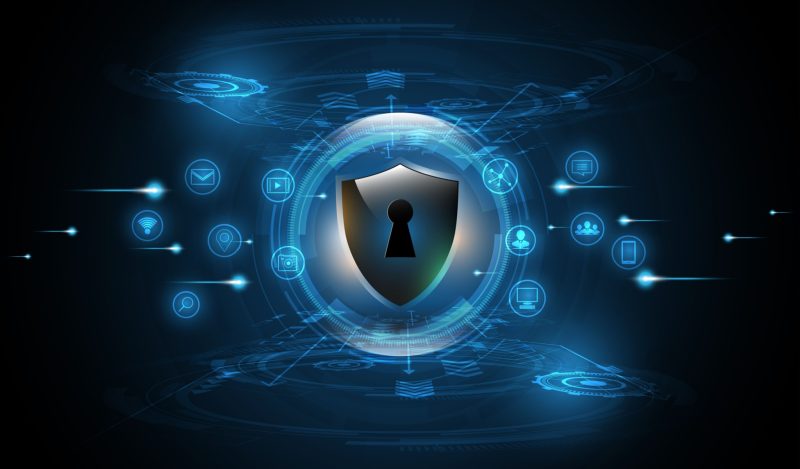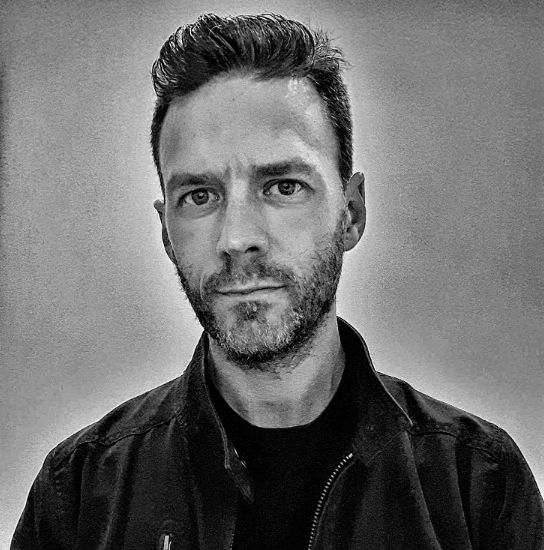The Australian government is seeking to exploit two recent knife attacks to relaunch its misinformation bill after it was put on ice late last year over free speech concerns.
Communications Legislation Amendment (Combatting Misinformation and Disinformation) Bill 2023, coupled with Australia’s existing eSafety legislation, would radically expand the government’s ability to control online speech and is part of a broader global push to reshape the online domain.
The legislation would extend the voluntary “disinformation code” launched in 2021 and in part crafted by US/UK NGO First Draft, now the Information Futures Lab. To some, First Draft is a leader in the “anti-disinformation” space; to others it is a key node in the global Censorship-Industrial Complex.
Among other activities, First Draft participated in an Aspen Institute workshop that rehearsed how to suppress the now-verified Hunter Biden laptop story, two months before the New York Post broke the story.
Australia has been out in front in shaping the bureaucratised internet: the eSafety Commissioner is touted as the first online “harm regulator” in the world and as recently detailed, is deeply embedded in the global networks driving this push, from the World Economic Forum, to the EU, to the Institute for Strategic Dialogue, and beyond.
Australia’s Conservative Party had until recently opposed the bill (despite getting it started), but is now wavering in the wake of the recent stabbings. On top of this, the Labor government is now proposing an expansion of the eSafety Commissioner’s powers.
This all bodes badly for free speech in Australia.
What’s in the Bill?
The misinformation bill would allow the Australian Media and Communications Alliance (ACMA) to levy fines of up to $6.8 million or five percent of a company’s global turnover if they deem a platform has taken insufficient steps to remove “disinformation.” The existing eSafety regulations, which also sit within ACMA but do not cover disinformation, can already levy fines of hundreds of thousands of dollars per day, as per the Commissioner’s recent penalisation of X regarding its refusal to globally take down images of one of the attacks.
The likely result of such harsh fines is that platforms will become more risk-averse and scrub legitimate citizen content, discussions, and information for fear of the costs.
ACMA claims Australia has been swept up in a global misinformation “crisis.” ACMA’s determination of this “crisis” was built on flawed research, including that of marketing agency We Are Social whose work includes promoting Tinder and helping clients sell sneakers.
The government, along with academia and mainstream media, are conveniently exempt from the bill. This is particularly ironic as one of the main sources of misinformation after the recent Bondi Junction stabbing was mainstream television news, which misnamed the attacker.
Exempting academics from the bill could be seen as a positive given the current wide-scale academic censorship experienced during the years-long Covid crisis. However, investigations into the Censorship-Industrial Complex revealed that academic institutions are at the forefront of the new restrictions on free speech. Everyone should be exempt from the bill, not just governments, academics, and key media players, because the logic of “disinformation” is fundamentally flawed.
The bill lowers the threshold for what can be considered harmful content online. Content must only be “reasonably likely” to “contribute to serious harm.” It need not be in and of itself directly “harmful.” And what kind of content is “harmful” according to the bill? Examples include, among others:
- hatred against a group in Australian society on the basis of ethnicity, nationality, race, gender, sexual orientation, age, religion, or physical or mental disability
- disruption of public order or society in Australia
- harm to the health of Australians
The first is only tangentially related to misinformation, and much more a case of hate speech or discrimination. “Disruption of public order” could sweep up all manner of legitimate protest, likewise, “harm to the health of Australians” could squash legitimate dissent or questioning of public health measures.
Furthermore, the bill states that content that is merely “misleading” can be considered disinformation, and allows the Minister of Communications to initiate and direct the terms of “disinformation” investigations at their pleasure.
The bill’s scope covers “digital services,” including “any of the content accessible using the service, or delivered by the service, is accessible to, or delivered to, one or more end-users in Australia.” That means it claims sovereignty over the content of non-Australians. As shown in the Australian Twitter Files, the Department of Home Affairs used the notion of “circulating a claim in Australia’s digital information environment” to justify requests to censor non-Australians. Would we like China, Russia, or the UK to be making judgments about the “truthiness” of content produced by Australians?
Outlets like the Guardian, however, claim the bill is “eminently sensible” and that the dissent is just a “scare campaign.” More than 23,000 public responses were made to the bill suggesting many people disagree. The Guardian has also tried to sweep away concerns about ACMA’s powers, carving out this feat of double-think: “Existing content moderation has not affected freedom of speech – ACMA has noted that platforms like Facebook have removed thousands of posts under the existing voluntary code.”
Moreover, the Guardian says that despite having major new powers, ACMA is unlikely to use them: “This bill creates a dialogue where, if an issue arises, ACMA can converse with the platforms about meeting their own self-imposed code of conduct and, if necessary, recommend that voluntary code be strengthened with the threat of the government enforcing a code of conduct as last resort.”
It is worth noting that former Prime Minister Malcolm Turnbull was critical in establishing the Guardian in Australia, and also first appointed eSafety Commissioner Julie Inman Grant.
Flawed Origins: First Draft
The misinformation bill extends the voluntary disinformation code developed by the Digital Industry Group Inc. (DIGI), in partnership with First Draft. In the words of DIGI, the legislation “would enable the ACMA to have a longer-term mandate to oversee The Australian Code of Practice on Disinformation and Misinformation, which DIGI developed and administers.”
First Draft was a leading “anti-disinformation” NGO founded by Claire Wardle that closed in 2022 and morphed into the Information Futures Lab at Brown University. Wardle coined the Orwellian concept of “malinformation” and was one of the biggest promoters of the Mis-, Dis-, and Malinformation framework that is now commonplace among “anti-disinformation” organisations and eager regulators.
In the words of DIGI, the code was initially developed “with assistance from the University of Technology Sydney’s Centre for Media Transition and First Draft.” First Draft’s Asia-Pacific office was housed at the Center for Media in Transition.
DIGI members include Apple, Facebook, Google, Microsoft, TikTok, and previously Twitter/X. X was dumped from the voluntary code in November 2023 following a complaint from the Omidyar-funded Reset Australia, a digital policy organisation focusing on “online harms,” relating to Australia’s failed 2023 Voice Referendum.
That DIGI chose a US/UK outfit to lead the development of the initial voluntary code underscores the global nature of the censorship push.
AMCA’s report on the “adequacy of digital platforms’ disinformation and news quality measures” references First Draft more than half a dozen times, as does ACMA’s paper which guided misinformation code development.
Why is this a problem? As noted earlier First Draft participated in information suppression operations, most egregiously the “pre-bunking” of the since-verified Hunter Biden laptop story.
The Twitter Files revealed that the Aspen Institute organised a “table-top exercise“ to gameplan a response to (a supposedly fictional) laptop belonging to Hunter Biden, the contents of which suggested corruption relating to Ukraine’s Burisma energy company and the Biden family. That event occurred in August of 2020, when the verified laptop had supposedly only been in the possession of the FBI, the New York Post, and the Trump campaign team.
Attendees, including First Draft, work-shopped how to snuff out such “disinformation” before it could take hold in the public consciousness. “Bring your most devious and cynical imaginations!” exclaimed Garret Graff, the Aspen Institute’s Director of Cyber Initiatives, in the invitation to First Draft and others:
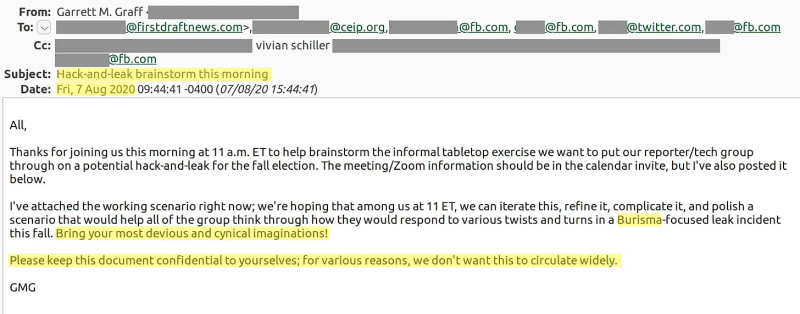

The exercise was also attended by the New York Times, Washington Post, Stanford University academics, Rolling Stone Magazine, CNN, NBC, the Carnegie Endowment for International Peace, as well as Twitter and Facebook.
First Draft was also included in emails where Graff explained how funny the prescience of their plan was:
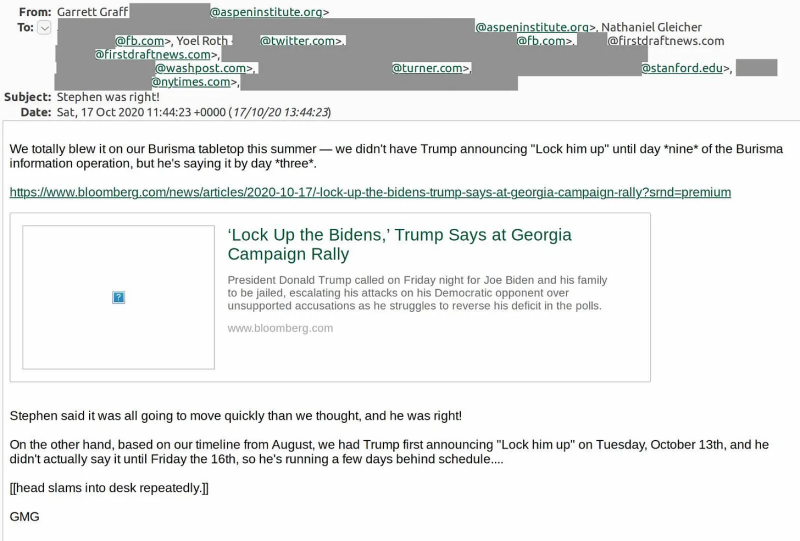

The story was denounced as a “Russian information operation“ by 50 former top US intelligence officials, and social media companies including Twitter and Facebook suppressed the New York Post report across their platforms, just in time to keep the story from gaining momentum prior to the 2020 presidential election, arguably influencing the result. It wasn’t until well after the election that admissions slowly trickled out that the laptop was real (as later admitted by both the New York Times and Washington Post).
Wardle also attended pre-election table-top exercises with Pentagon officials:
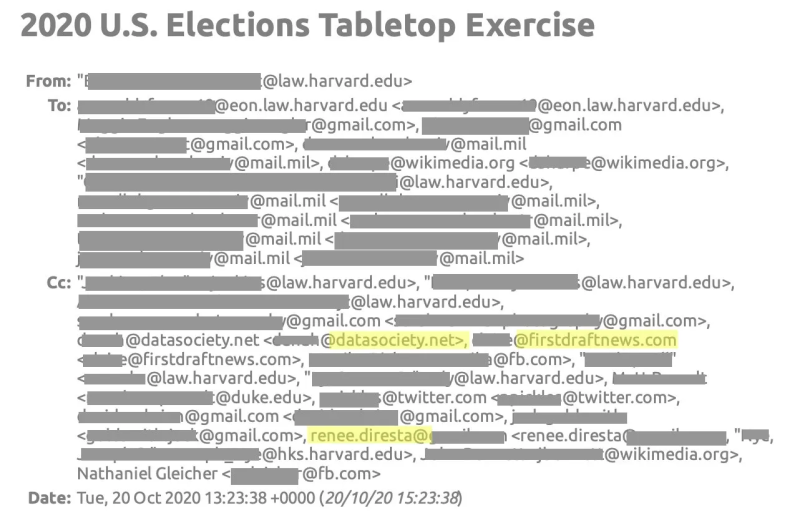

Wardle was part of old Twitter’s rapid-response anti-disinformation Signal group that also included former CIA fellow Renee DiResta, Ben Nimmo, formerly of Pentagon-funded Graphika, Graham Brookie of the Atlantic Council, and William Wright of the National Endowment for Democracy:
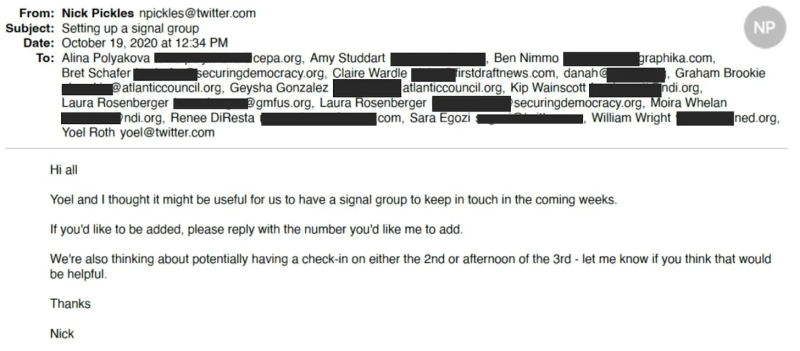

First Draft was also the only NGO in the Trusted News Initiative (TNI), a consortium of legacy media organisations including the BBC, the New York Times, Facebook, Twitter, and the Washington Post, among others. TNI coordinated to steer the prevailing Covid narrative in favour of the guidelines and mandates imposed by most major governments and to suppress dissent. A lawsuit against TNI has shown that TNI claimed it was misinformation to suggest that “Covid vaccines are not effective in preventing infection.”
This is a pattern among “anti-disinformation” groups like First Draft. During the pandemic, First Draft produced multiple incorrect “fact-checks” such as suggesting a possible Wuhan lab leak was a “conspiracy” theory, instead insisting that the virus “likely transferred to humans via another animal, possibly the armadillo-like pangolin.” The group also claimed it was “misinformation” to suggest that vaccine mandates would be introduced – as they were.
First Draft’s reports seek to obfuscate and confuse, maligning any criticism of authorities or those in their milieu as a “far-right” preoccupation, a recurring characteristic of the misinformation-monitoring industry.
Like NPR’s Katherine Maher, Wardle also sees white men as a key source of the problem, in one video claiming “white men over 60” are the people most likely to spread “misinformation.” “Luckily there’s none of those people in this room” she goes on to say:
First Draft/The Information Futures Lab did not respond to requests for comment.
The Australian Twitter Files
How has free speech in Australia fared under the voluntary disinformation code?
Through the Australian Twitter Files, I discovered that the Department of Home Affairs (DHA) requested Twitter remove 222 pandemic-related tweets: often jokes, commentary, scientific debate, and information that turned out to be true. Rather than relying on Australian scientists, the DHA referred Twitter to Yahoo! News and USA Today “fact-checks” to justify their censorship requests. FOIA documents revealed there were more than 4,000 such requests to social media.
When asked for comment, the DHA stated that it was merely referring content to social media platforms for “review against their terms of service” and that “any action taken by digital platforms in response to these referrals was a matter for those platforms.” It sought to clarify that the Department “no longer refers Covid-19 misinformation or disinformation to digital platforms.”
Their previous referrals however demonstrate a breathtaking level of micro-management. The DHA requested accounts with just 20 followers have their posts removed, as well as accounts that didn’t even belong to Australians but were “retweeted in Australia’s digital information environment.”


These Covid-era attempts by the Australian government to demand global content takedowns foreshadowed current demands from the eSafety Commissioner after the two recent stabbing attacks in Sydney.
As noted earlier, it mirrors the proposed misinformation bill’s attempt to cover any “content accessible using the service, or delivered by the service, is accessible to, or delivered to, one or more end-users in Australia.”
The Twitter Files show that the Australian Twitter staff enthusiastically cooperated with the DHA to enable censorship. These same people also contributed to drafting the voluntary misinformation code. That code, which Twitter signed up to at the time, failed to protect free speech and instead shut down legitimate debate during the Covid panic.
Opposing the Bill
Despite assurances to the contrary, the misinformation bill violates Australia’s commitment to freedom of opinion and expression, as laid out in Article 19 of the Universal Declaration of Human Rights, to which Australia is a signatory. The bill’s imprecise language leaves it open to abuse by the government of the day and unelected bureaucrats.
As Australian Human Rights Commissioner Lorraine Finlay noted: “If we fail to ensure robust safeguards for freedom of expression online, then the measures taken to combat misinformation and disinformation could themselves risk undermining Australia’s democracy and freedoms.”
A range of laws already exist to combat the kinds of issues the government seeks to address – from false advertising legislation, and defamation law, to the already overly broad eSafety legislation.
Unfortunately, there is a dearth of progressives willing to push back against this kind of censorship legislation, per the new normal everywhere, especially in the midst of a moral panic. The left-wing Media Entertainment and Arts Alliance made a moderately critical submission that recognises the potential impact on freedom of expression. Other progressives (notably the Greens and Teal independents) are frustrated the bill doesn’t go even further. Luckily they now have the eSafety commissioner to step in for them.
Massive amounts of attention have been placed on X for its non-compliance, but other digital platforms are also coming under government pressure. On April 19, Rumble CEO Chris Pavlovski claimed “Rumble has received censorship demands from Australia, New Zealand, and other countries that infringe on everyone’s human rights. We are noticing a dramatic increase in global censorship, unlike anything we’ve seen before.”
Open discourse is the central pillar of a free society and is essential for holding governments accountable. Free speech fundamentally protects and empowers vulnerable groups. Individual speech and expression protections are not just for views we agree with but also for views we strongly oppose.
The war in Gaza has woken up some on the Left to the risks of empowering the government and platforms to decide what is true and false, and last year’s popular pushback frustrated the Australian Government’s attempt to pass the misinformation bill.
However a new attempt is underway to chill free speech in Australia, and panic is the Government’s best weapon to reach this end.
Ultimately our best weapon against misinformation and disinformation is free speech. What is truly needed is legislation that better protects that right.
With thanks to Rebekah Barnett, Alex Gutentag, and Michael Shellenberger. (Thanks do not imply content endorsement.)
Republished from the author’s Substack
Join the conversation:


Published under a Creative Commons Attribution 4.0 International License
For reprints, please set the canonical link back to the original Brownstone Institute Article and Author.
